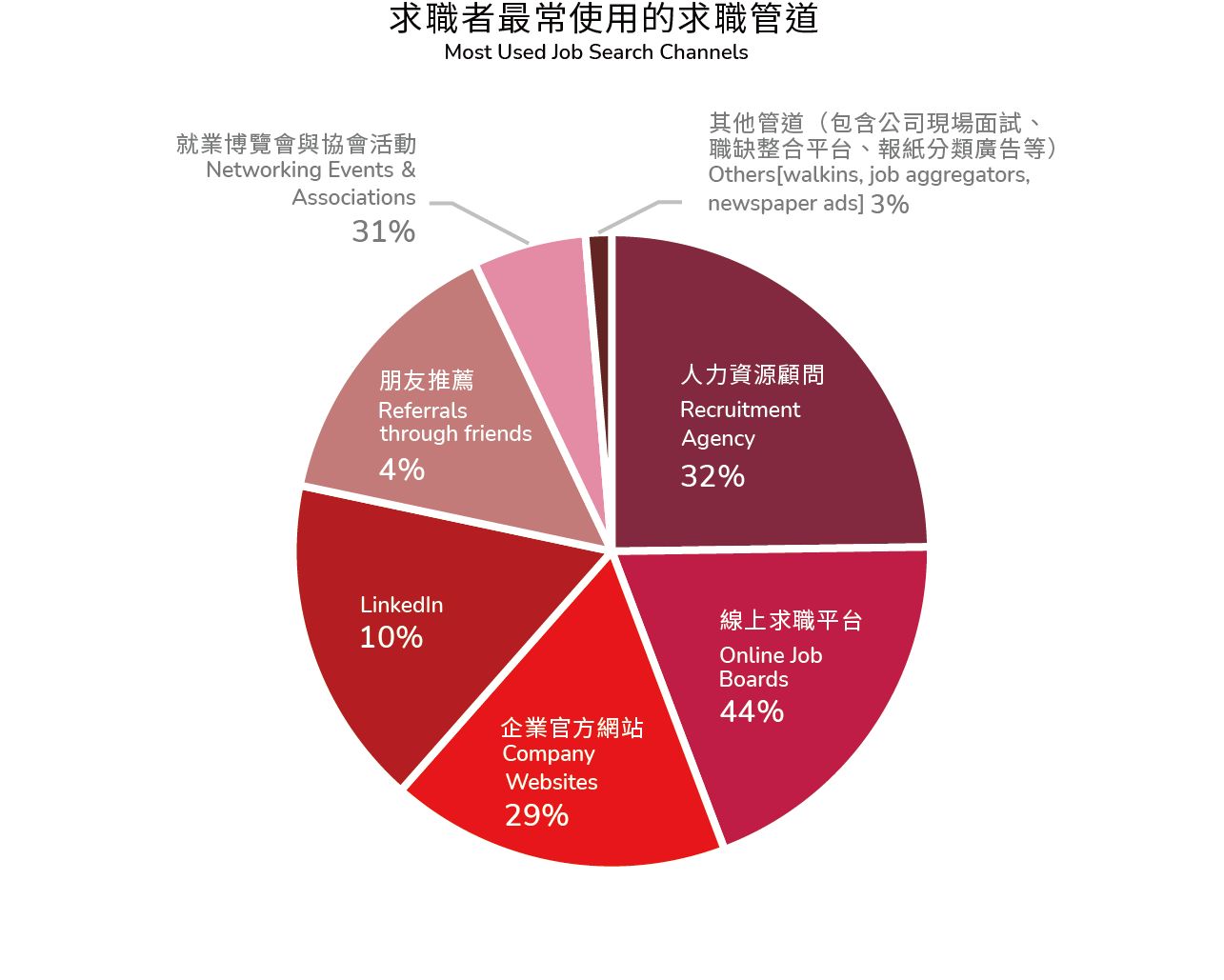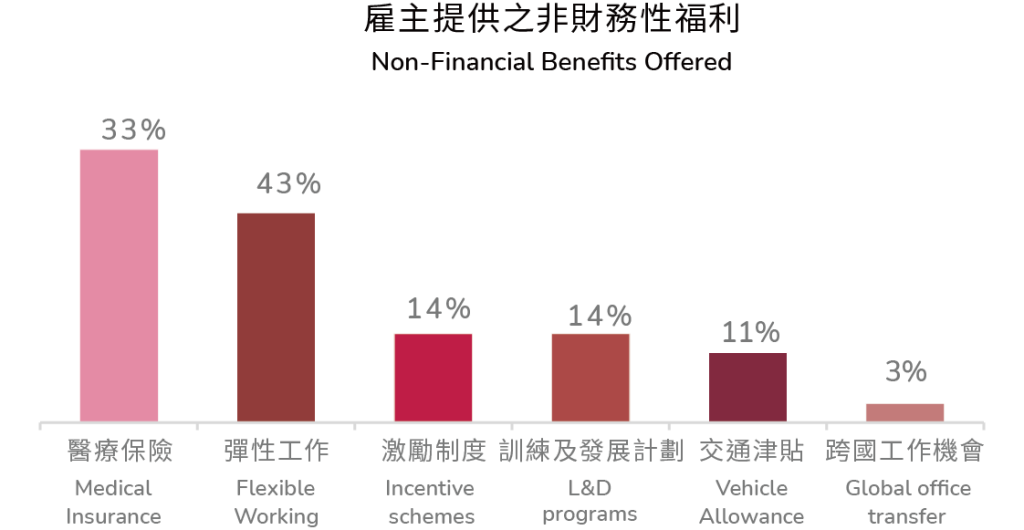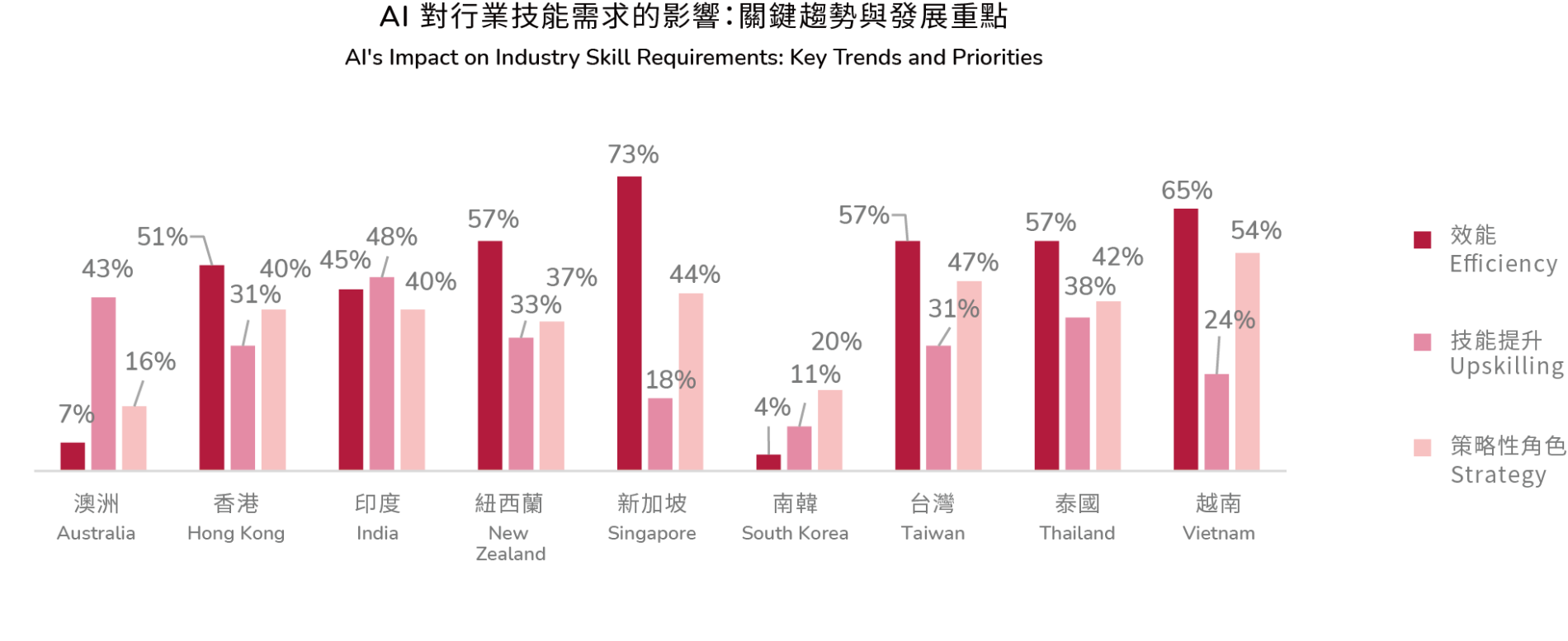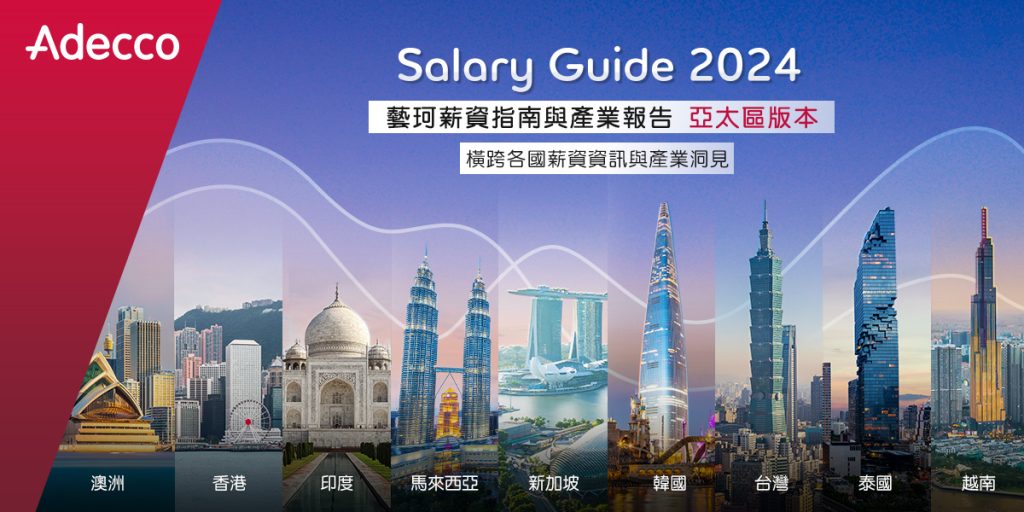
2025 APAC Salary Trends and Survey Results
亞太地區憑藉其經濟活力與文化多樣性,成為全球成長與發展的重要引擎。這片充滿動能的市場吸引大量投資,並在科技進步的驅動下持續推動創新。然而,產業變革、日益加速的自動化,以及學非所用的現象,使該地區在創造長期穩定就業機會方面面臨挑戰,甚至可能加劇勞動市場的不確定性。
因此,積極推動職能培訓與人才發展,尤其是在人工智慧(AI)與網路安全等高需求領域,對於縮小人才落差至關重要。同時,疫情加速了遠距工作的普及,促使企業採取混合辦公模式,這不僅要求組織靈活應對區域差異,還需持續培養與提升員工的核心技能。此外,打造包容性的職場環境亦是企業成功的關鍵之一。將多元、平等及包容(DEI)列為優先事項,不僅能激發創新,更能充分發揮多元人才的潛力,進而提升組織的韌性與競爭力。
本年度指南深入探討如何面對大趨勢(megatrends),並分析其對工作模式、職業規劃與員工期望的影響,同時探討重塑職場的關鍵因素。受訪者普遍認為,彈性工時安排與職業發展是吸引並留住人才的核心要素。隨著由人工智慧推動的創新逐步重塑關鍵技能,DEI 實踐(如多元招募與薪酬公平)在建立信任及提升人才留任方面,則扮演了至關重要的角色。
這份指南不僅提供薪資參考標準,亦作為一項策略資源,幫助企業掌握當前勞動市場的最新趨勢。透過運用這些寶貴的洞察,並將 AI 與 DEI 納入企業核心策略,企業將能夠提升雇主品牌,並在變幻莫測的市場中,穩居競爭優勢。
The APAC region stands as a beacon of growth and potential, characterized by its economic dynamism and cultural diversity. This vibrant landscape attracts significant investment and fosters innovation, particularly driven by technological advancements. However, the region faces significant challenges in creating permanent, long-term job opportunities, with shifting industries, increasing automation, and persistent skill mismatches potentially leading to instability.
Addressing skills gap through proactive upskilling initiatives is essential, especially in high-demand areas such as AI and cybersecurity. The pandemic has further accelerated remote work adoption, leading to hybrid models that require organizations to adopt and continuously develop their workforce's skills while navigating regional nuances. At the same time, fostering inclusive workplaces is critical. Prioritizing DEI not only enhances innovation but also builds resilient organizations by leveraging the potential of diverse talent pools.
This year's guide explores how megatrends are influencing work life, career plans, and employee expectations, as well as factors reshaping the workplace. Respondents highlighted flexible working arrangements and professional development as top priorities for talent retention. AI-driven innovations are redefining essential skills, while DEI practices, such as inclusive hiring and pay equity, are vital for fostering trust and retaining talent.
This guide serves not only as a salary benchmark but also as a strategic resource for understanding today’ s workforce. By l everaging these insights—and embedding AI and DEI into their core strategies—businesses can enhance their employer brand and ensure they remain competitive in an increasingly dynamic environment.
對工作生活影響深遠的巨變趨勢
Megatrends that have the most influence on work life
在亞太地區,數位化與彈性工時已成為最具影響力的變革趨勢,突顯了職場朝向數位化與混合工作模式的典範轉移。泰國(73%)、印度(64%)、越南(64%)和台灣(54%)在數位化普及程度上領先亞太地區。在彈性工時模式的推行上,泰國(73%)、印度(61%)、香港(58%)和越南(58%)的比例同樣名列前茅。
此外,在科技發展較為先進的國家,如新加坡(60%)、台灣(49%)和印度(42%),人工智慧已成為不可或缺的重要技術。紐西蘭在數位化(49%)與彈性工時(51%)方面維持中等水準,展現出在職場轉型上的穩健發展。而南韓則具備高度成長潛力,未來表現值得關注。此外,印度對績效評估與獎金發放的重視程度尤為突出,高達 32%,遠超過亞太地區平均不到 10% 的水準。
Across the APAC region, digitization and flexible working are the most influential megatrends, reflecting a paradigm shift toward digital workplaces and hybrid work models. Digitization leads in Thailand (73%), India (64%), V ietnam (64%), and Taiwan (54%). Meanwhile, Flexible Working adoption is notably high in Thailand (73%), India (61%), Hong Kong (58%), andVietnam (58%).
Artificial Intelligence (AI) is highly significant in tech-forward nations like Singapore (60%), Taiwan (49%), and India (42%). New Zealand shows moderate adoption across digitization (49%) and fl exible working (51%), suggesting a balanced approach to workplace transformation. In contrast, South Korea shows potential for growth. Additionally, India stands out with a high focus on appraisals/bonus payouts (32%) compared to the
regional average of below 10%.
雇主的核心優先事項如下
Key Priorities for Employers
- 加速推動數位化與自動化,以維持營運效率。Priorities digitization and automation to maintain operational efficiency.
- 隨著混合工作模式與零工模式需求增加,雇主需靈活調整政策與企業架構。High demand for hybrid and gig-based models underscores the need for policy and infrastructure adjustments by employers.
- 推行人工智慧,推動創新並提升生產力。Embrace AI adoption to drive innovation and improve productivity.

亞太地區求職者獲取新工作機會的首選管道
Preferred Channels for New Opportunities for APAC region
根據調查數據顯示,超過半數(56%)的亞太區求職者會透過人力資源顧問公司尋找工作機會,凸顯人資顧問公司已成為該地區偏好的求職管道。
在人力資源顧問公司在亞太區就業市場中扮演著舉足輕重的角色。台灣以 80% 的比例居冠,其次是南韓 78% 和越南 77%,展現出人力資源顧問公司在專業人才媒合上的強大影響力。此外,新加坡與印度的求職者也分別有 66% 和 53% 透過人資顧問尋找工作,顯示這類專業管道的普及程度。然而,傳統的人際網絡求職方式依然備受青睞,尤其在台灣與越南,分別有 61% 和 60% 的求職者依靠朋友推薦尋找工作,突顯人脈在職涯發展中的關鍵作用。
APAC's job seekers primarily rely on recruitment agencies (56%), reflecting their strong role as the preferred job search channel across the region.
Recruitment agencies dominate job searches in Taiwan (80%), South Korea(78%), and Vietnam(77%), highlighting their critical role in connecting job seekers with opportunities efficiently across the APAC region particularly in Singapore (66%) and India (53%). Meanwhile, referrals through friends remain a popular channel, especially in Taiwan(61%) and Vietnam(60%), showcasing the importance of personal networks injob searches.
雇主的重點招募策略如下
Key Priorities for Employers
- 善用專業獵才顧問與人際網絡的力量,以擴大人才招募管道。Use recruitment agencies and networks to source talent.
- 著重經營數位媒體上的企業形象。Strengthen employer branding online.
- 深入了解各區域求職市場特性,確保招募策略貼近目標市場需求。Align hiring strategies with local preferences.

人才流動現象與企業啟示
Career Movements and Employer Implications
各地區就業趨勢呈現顯著差異:澳洲就業市場最為活躍,62% 的專業人才正積極尋找新機會。相較之下,新加坡展現較高穩定性,只有 23% 的職場人士正積極轉職。南韓市場則呈現明顯分化,46% 的人才主動求職,48% 保持開放態度。台灣和紐西蘭的就業市場相對平穩,積極求職者分別佔30% 和 23%,而考慮轉職者則分別達 55% 和 50%。香港和泰國的人才流動較為頻繁,積極求職比例分別為 33% 和 41%。
整體而言,亞太區就業市場呈現高度活力:42% 的專業人才正在主動尋找新的發展機會,47% 則持開放態度,反映當前市場既充滿挑戰也蘊含機遇。留才挑戰:針對澳洲、南韓和泰國等人才流動頻繁的市場,企業需著重完善留才機制。吸引人才:在新加坡和香港等相對穩定的市場,可優先投資內部人才發展。
調整策略: 在流動性較高的市場中,雇主必須強調提升技能、提供職涯發展機會以及具競爭力的福利,以吸引和留住人才。
Australia leads job mobility with 62% of professionals actively seeking new roles. In contrast, Singapore shows stability, with only 23% actively looking for new opportunities. South Korea has 46% ac tively searching and 48% open to new options, indicating a mix of active and passive interest.
Taiwan and New Zealand reflect stable workforces, with 30% and 23% actively looking, while 55% and 50% are open to new roles. Hong Kong and Thailand exhibit moderate mobility at 33% and 41% actively looking. Overall, 42% of professionals are actively seeking opportunities, with 47% open to new roles but not currently searching, showcasing a dynamic job market with both challenges and opportunities for employers.
Retention Challenges: High job mobility in Australia, South Korea, and Thailand demands robust retention strategies.
未來一年換工作時的關鍵考量
Key Priorities When Considering a Job Change in the Next 12 Months
掌握影響職涯抉擇與企業決策的關鍵因素,對於職場發展至為重要。透過深入了解各產業薪資動態、消費者行為轉變,以及員工需求演進等市場脈動,能協助個人在職涯規劃上做出更精準的判斷。各類資源,如薪資調查報告和產業趨勢分析等,提供了豐富的數據參考,能有效引導個人在職涯選擇時做出更明智的決策。
亞太區職場人才在評估工作機會時,最看重的三大要素為薪資福利(77%)、工作與生活的平衡(48%)以及職涯發展(44%)。這些數據反映出現代職場人才對經濟保障和生活品質的重視,同時也凸顯各地區因文化背景與經濟發展程度不同而產生的差異。
- 薪資福利方面,泰國(92%)和台灣(89%)的求職者特別重視,其次是印度(71%)、香港(64%)和越南(60%),顯示這些地區的人才在選擇工作時,特別關注企業所提供的整體薪酬待遇。
- 工作生活平衡成為新興重點,尤其在泰國(67%)、印度(63%)、台灣(62%)和紐西蘭(55%)等地區,職場人才格外注重如何在事業與個人生活間取得平衡。
- 職涯發展層面,新加坡(67%)和印度(62%)的專業人士對此表現出高度重視,遠超過區域平均水準。
Understanding the key priorities that influence job and company choices is essential. From insights on salary trends across various industries to shifts in consumer and employee behaviors, staying informed about the
evolving labor market landscape can guide individuals toward making informed decisions. Resources like salary guides and megatrend reports provide valuable data to navigate these decisions effectively.
Key drivers across the region include compensation and benefits (77%), work-life balance (48%), and professional development (44%), These preferences reflect a growing emphasis on both financial security and
personal well-being, with significant regional variations that underline cultural and economic differences.
- Compensation & Benefits: Thailand (92%), Taiwan (89%), India (71%), Hong Kong (64%), and Vietnam (60%) show a strong focus on financial rewards.
- Work-Life Balance: Thailand (67%), India (63%), Taiwan (62%), and New Zealand (55%) place higher emphasis on maintaining work-life.
- Professional Development: Singapore (67%) and India (62%) priorit ize growth opportunities significantly above the regional average.
企業的關鍵策略重點如下
Key Priorities for Employers
- 提供具市場競爭力的薪酬福利制度。Offer competitive compensation and benefits.
- 營造重視工作生活平衡的企業文化。Foster a positive work-life balance culture.
- 持續深化雇主品牌價值以吸引頂尖人才。Strengthen employer brand to attract top talent.

員工福利及津貼
Employee Benefits and Perks
亞太區企業在非現金福利方面,主要著重於提供健康醫療保險和彈性工時制度,充分展現對員工身心健康和工作生活平衡的重視。不過,在學習發展計畫的推動上仍有待加強。這個現象也反映出企業在促進員工長期成長和人才留任方面,存在潛在機會。
Across APAC, health/medical insurance and flexible working arrangements are the most provided non-financial benefits, reflecting a broader shift towards employee well-being and work-life balance. Learning and Development programs need to be more utilized, representing a missed opportunity to drive long-term growth and retention.

探索生成式 AI 之關鍵趨勢
Insights on Gen AI
在當今快速變化的勞動市場中,生成式人工智慧的角色正變得越來越關鍵。這不僅是一項技術突破,更是顛覆性的變革,正在重新定義企業與員工的互動模式,並改變創新與創造的方式。從提升生產力到創造全新職位,生成式人工智慧正加速重塑全球各行各業。其強大的內容生成、自動化流程與輔助決策能力,不僅幫助企業保持競爭優勢,也讓員工能夠專注於更具價值的核心工作。
在亞太地區,效率與技能提升是企業關注的核心議題。新加坡與越南在生產力方面表現突出,而澳洲則仍有進一步提升的空間。印度與澳洲持續聚焦於技能發展,以應對不斷變化的市場需求;相較之下,台灣與香港則採取較為均衡的策略,在效率與技能提升之間保持平衡。
在越南、新加坡與香港,策略性角色尤為關鍵,企業將領導力與長期目標緊密結合,以確保可持續發展。印度則將策略規劃與技能發展相合, 推動企業的長遠成長。至於紐西蘭, 則在效率、技能提升與策略發展之間取得良好平衡,確保穩定進步。
儘管各地的優先事項有所不同,透過量身打造的策略與生成式人工智慧的應用,企業能夠有效提升員工能力、推動創新,並創造更多成長機會。
In today's rapidly evolving workforce, the role of Gen AI is becoming increasingly pivotal. It is not just a technological advancement—it's a game-changer that is redefining how businesses and employees interact, create, and innovate. From enhancing productivity to fostering new job roles, Gen AI is reshaping industries across the globe. Its abilit y to generate content, automate processes, and assist in decision-making is empowering companies to remain competitive while enabling workers to focus on higher-value tasks.
Across the region, Efficiency and Upskilling stand out, with Singapore and Vietnam leading in productivity, while Australia shows room for improvement. Upskilling remains a focus in India and Australia, reflecting the need to meet evolving market demands, while Taiwan and Hong Kong take a balanced approach.
Strategic Roles are prominent in Vietnam, Singapore, and Hong Kong, aligning leadership with long-term goals. India combines strategy with skill development, fostering sustainable growth. New Zealand balances
efficiency, upskilling, and strategy, driving steady progress.
While priorities vary, tailored strategies and Gen AI adoption can enhance workforce capabilities, drive innovation, and unlock growth opportunities.
企業核心優先事項如下
Key Priorities for Employers
- 著重培養關鍵技能,如領導力發展、人工智慧應用、資訊安全及法規遵循等面向,打造高競爭力的團隊,有效因應市場的持續演變。Prioritise skills development in leadership, AI, cybersecurity, and ethical compliance to ensure a competitive workforce and meet evolving market demands.
- 投資客製化培訓與再培訓計畫,以靈活應對勞動力變革並推動企業穩健成長。Invest in tailored training programs and reskilling initiatives to address dynamic workforce needs and support organizational growth.
- 強化領導力與策略思維以培養創新能力並推動長期發展。Focus on enhancing leadership and strategic thinking capabilities to foster innovation and drive long-term success.

多元、平等、包容關鍵趨勢
Insights on Diversity, Equity, and Inclusion
職場上對於彈性工時制度以及薪資公平制度的重視,反映出員工期待公司能打造一個兼具公平性與彈性的工作環境。企業推動的多元共融培訓方案,主要在於提升同仁對潛意識偏見的覺察;而開放透明的雙向溝通,則是建立互信及制度問責的重要基石。企業若能積極投入這些政策,通常能有效提升員工向心力、降低離職率,進而提高工作效率。
亞太區特別重視彈性工時制度的推動,其次則是多元、平等、包容訓練計畫及薪資公平性評估,反映出企業在工作生活平衡、教育訓練及薪資公平等面向的多元化發展重點。
The emphasis on fl exible work policies and pa y equity reviews indicates that employees expect employers to create equitable and adaptable work environments. Diversity training programs highlight the need for raising awareness about unconscious biases, while transparent communication is crucial for building trust and accountability. Employers who invest in these initiatives are likely to see increased engagement, retention, and productivity.
The APAC region shows a robust inclination toward flexible work policies, followed by diversity training programs and pay equity reviews, reflecting a mix of priorities for work-life balance, education, and compensation equity.
企業的重點施政方向如下
Key Priorities for Employers
- 亞太區的企業應以推動彈性工時制度為首要任務,並定期檢視薪資公平性,藉此營造更具包容性且更公平的職場環境。APAC employers should prioritize flexible work policies and pay equity reviews to foster inclusive and equitable workplaces.
- 為提升同仁認同感,須強化在職培訓方案並建立透明的雙向溝通管道,以建立互信及問責。Boost employee engagement with training programs and transparent communication to build trust and accountability.
- 積極推動多元人才招募方案(25%)及各式研習活動與專題講座(24%),以支持人才多元發展。Invest in inclusive hiring practices (25%) and workshops and talks (24%) to support diverse talent and development.
- 為強化職場的多元、平等與包容性,建議設立專屬管道讓少數族群能充分表達意見(14%),同時定期舉辦文化交流活動(11%),藉此回應員工對於打造包容職場與提升文化認同的需求。Incorporate platforms for underrepresented voices (14%) and celebrations of events (11%) into DE&I strategies to reflect employees' needs for inclusion and cultural recognition.

本次調查中,藝珂集團訪問了:
The Adecco Group surveyed:
8,997 名來自亞太地區的專業人士 (包含雇主及員工)
8,997 professionals including both employers and employees
9 個國家- 澳洲、香港、印度、紐西蘭、新加玻、南韓、台灣、泰國及越南
Across APAC region 9 Countries - Australia, Hong Kong, India, New Zealand, Singapore, South Korea, Taiwan, Thailand, and Vietnam.
橫跨 13 個產業
Working in 13 Industries
- 航太 / 國防
Aerospace / Defense - 汽車產業
Automotive - 顧問
Consulting - 金融服務/ 銀行
Financial services / Banking - 政府 / 機構 / 教育
Government / Institution / Education - 資訊 / 數位科技
Information / Digital Technology
- 法律
Legal - 生命科學 / 醫療保健
Life sciences / Healthcare - 物流 / 供應鏈/ 交通與運輸
Logistics / Supply Chain - 製造業 / 工程(含半導體)
Transportation and Mobility
Manufacturing / Engineering (Incl. Semi conductors)
- 地產 / 不動產
Property / Real Estate - 公關 / 媒體 / 出版
Public Relations / Media / Publishing - 零售 / 消費品(包含快速消費品) Retail / Consumer goods (Including FMCG)











